Sustainable parenting
1
Table of contents
1. What is the purpose of parenting? 8
1.1 Give love 8
1.2. Give your children roots and wings 9
1.3. Believe and pass on to children that the world is a good, safe and beautiful place 11
1.4. Help your children to live as if they already have the job they search for 12
2. What makes you more certain that you want to be a parent or not be a parent? 13
2.1. Ask your heart if having a child is the right thing to do 13
2.2. Consider whether you can afford to have a child or not 13
2.3. Think about how you want to live 14
3. What are examples of ways of working that help strengthen sustainable parenting? 16
3.1. Invest time in learning 16
3.2. Work with people who value you 17
3.2. Work with people who believe in flexibility 17
4. What are ways to parent in environmentally sustainable ways? 19
4.1. Cook at home 19
4.2. Use natural materials when you prepare dinner 20
4.3. Use compost bins to turn kitchen waste into compost 20
4.4. Reuse things 21
2
4.5. Ask children how we should treat the environment 22
4.6. Use electric vehicles 23
5. What are ways to parent in emotionally sustainable ways? 24
5.1. Admit mistakes you make 24
5.2. Admit when you don’t know something 24
5.3. Develop courage to communicate when you need help 26
5.4. Express interest in developing yourself 27
5.5. Share your experiences of shame 28
5.6. Ask your child what emotions he or she feels 29
5.7. Do what you love 31
5.8. Play music 31
6. What are ways that parents can communicate sustainably? 32
6.1. Give full attention to children 32
6.2. Ask questions to your children 34
6.3. Listen to your children 34
6.4. Communicate calmly with your children 35
6.5. Avoid judging your children 36
6.6. Use digital technology to communicate with your children 38
6.7. Use music to communicate with your children 38
7. What are ways that parents can sustainably develop relationships with their children? 40
3
7.1. Adapt the way you parent to needs of your children 40
7.2. Learn about the personality of your child 41
7.3. Support children in pursuing their goals 41
7.4. Praise values of your children 43
7.5. Share experiences with your children 44
7.6. Express gratitude towards your children 47
7.7. Talk with your child about who mother and father are 48
7.8. Play music for and with your child / children 48
7.9. Take a trip with your children or grandchildren 50
7.10. Try out new ways of connecting with your children 50
7.11. Spend time with your children 51
8. What are ways that parents can help their children develop awareness of the human body? 52
8.1. Breastfeed your children 52
8.2. Touch your children 52
8.3. Do parent-child gymnastics with your children 55
8.4. Hold your children in your arms 55
9. What are ways that parents can help their children develop motor skills in sustainable ways 57
9.1. Ask children for help to buy groceries 57
4
9.2. Ask children for help to prepare food 57
9.3. Ask children for help to wash clothes 59
9.4. Let children create their own playgrounds 59
10. What are ways that parents can help their child develop social competencies? 61
10.1. Enable your child to play with other children 61
10.2. Help your child to learn to help others 63
10.3. Help your child be cared for by several caregivers 64
11. What are ways that parents can help their children develop responsibility? 65
11.1. Ask questions to your children when they misbehave 65
11.2. Focus on dialogue - not on getting and giving permission 66
11.3. Gradually give your children freedom to do things 67
11.4. Talk with your child about consequences of their decisions 68
11.5. Trust your children 69
12. How can parents help their children understand sustainable finance? 71
12.1 Talk about differences between spending, investing and donating 71
12.2. Help develop greentech initiatives and talk to your children about it 71
13. How can parents and children use technology in sustainable ways? 72
13.1. Talk to children about when they use and do not use electronic devices 72
13.2. Use technology for coaching 74
5
14. What can parents do to stimulate interest children have in learning? 76
14.1. Look up words you do not understand 76
14.2. Read aloud for your children 76
14.3. Read yourself 77
14.4. Give your children freedom 77
14.5. Let children play a lot 78
14.6. Help children experience well-being 80
14.7. Praise your children for their competencies 80
15. What can parents do to make their relationship work? 81
15.1. Listen to needs your partner has 81
15.2. Split up tasks 82
15.3. Help each other 83
15.4. Communicate well with each other 83
15.5. Talk about gender roles 85
15.6. Take time together away from the home once in a while 86
16. What can parents do to make a break-up between them work? 88
16.1. Accept everything 88
16.2. Respect the other parent 88
16.3. Be open with your children about problems you have in your relationship 90
16.4. Tell your children exactly what will happen 91
6
16.5. Find parenting solutions that work for everyone 92
17. What can governments do to strengthen sustainable parenting? 93
18. Sources 94
18.1. Books 94
18.2. People I learned from 95
18.3. Text font used 96
19. Reflections on the process 97
19.1. How did I come to write this book? 98
19.2. Why open source? 99
19.3. What is the key insight of the book? 100
19.4. How do people use the book? 101
7
On
Stamm
8
1. What is the purpose of parenting?
1.1 Give love
page 7 of the book “Lasst die Kinder los: Warum entspannte Erziehung
lebenstüchtig macht”
1 , Margrit
wrote: “Most
parents, or those who want to be,
say
they have children to give life meaning,
to give love and to
stop taking themselves so seriously.”
1 https://www.goodreads.com/review/show/2512751574
1.2. Give your children roots and wings
The primary purpose of parenting is - according to this article2 - to “raise fully functional adults who can take care of themselves and make a positive contribution to society.” On page 128 of the book “Kinderjahre”, Remo Largo shares the following quote by Johann Wolfgang von Goethe:
2 https://psychcentral.com/pro/exhausted woman/2016/08/the primary purpose of parenting
9
Children should get two things from their parents: Roots and wings.
Source: https://pixabay.com/photos/name-butterfly-name-tag-children-372190/
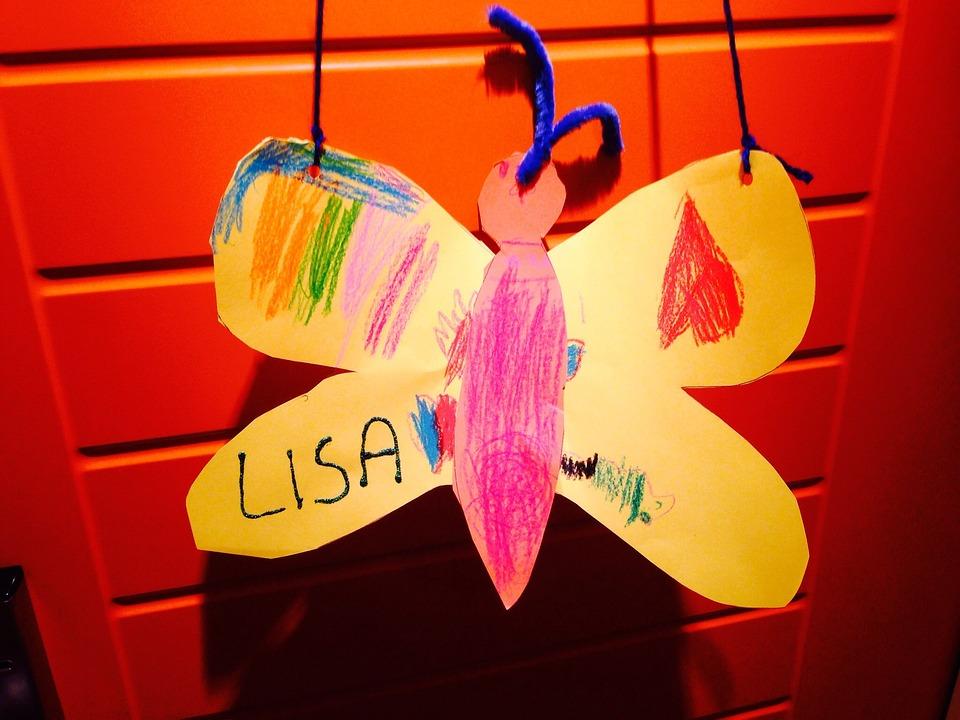
10
During a CreativeMornings event in March 2022 Ukrainian violinist Natalia Rezinkova played a Ukrainian lullaby song. She explained that she plays the song for her two small children aged 3 and 5 every night before they go to sleep. As the village in Ukraine, in which Natalia, her husband and their two children lived, was bombed, Natalia fled with her two children to Switzerland. Her husband stayed in Ukraine and joined the military to defend the country.
3
During a Café Scientifique event in May 2022 about the human brain, Nora Maria Raschle responded to a question about how we go about with the emotion fear. She expressed that it is important for children to feel secure and safe. Nora elaborated on this by saying that in her role as mother of teenage children, she experiences it as important for children's growth that they feel safe. I understood that feeling secure and safe helps a child to learn better.
Adam Grant explained that people, who believe the world is generally good and safe, have better mental health and more success.4 And on page 145 of the book “Kinderjahre”, Remo Largo wrote that feeling safe and accepted is a basic need of every child.
3 https://www.instagram.com/p/CbhvWpIsgh0/
4 https://www.instagram.com/p/CbaRbZwOjga/
11
1.3. Believe and pass on to children that the world is a good, safe and beautiful place
During an event5 via zoom featuring the authors Susannah Harmon Furr and Nathan Furr I asked this question, “I heard you say that you have 4 children. Can you give concrete examples of what you do to help your children learn what you learned while writing the book? More concretely, what do you do to help your children feel psychologically safe to express uncertainty?”
From the response by Susannah Harmond Furr I understood this: Following his college education in New York, the son of Nathan and Susannah found it difficult to get a job. And, as I understood, their son felt sad about the situation. Using a method from their book, Susannah and Nathan helped their son to live as if he already has the job he searches for. They encouraged their son to continuously ask himself this question,
What can I do right now?
5 https://reinforceua.com/en/lectures/19
12
1.4. Help your children to live as if they already have the job they search for
2.1. Ask your heart if having a child is the right thing to do
During a conversation in August 2022 via Google Meet, Sophie Rudolph mentioned that for her it was an emotional decision to have children. It was not a rational decision she took. In her heart and mind she gave room to have children.
During a conversation in August 2022 via Google Meet, Sophie Rudolph explained that a stable working situation and a stable income played an important role for her decision to have a child.
13
2. What makes you more certain that you want to be a parent or not be a parent?
2.2. Consider whether you can afford to have a child or not
2.3. Think about how you want to live
In a posting6 as well as in a conversation7 with Sharleen Joynt, Keltie Maguire expressed questions about certainty / uncertainty of having children. For example, Keltie explained at minute 8 of the conversation that she is 99% certain that she does not want to have children. And at minute 54, she mentioned that the thought of becoming pregnant terrifies her even more now, when she is 40 years old and in a long term relationship, than when she was 20 years old and single. From minute 8 of the conversation8 Keltie Maguire explained that instead of asking herself how certain she is that she wants to have children or not have children, it works better for her to ask herself how she wants to live. She explained that the question about what she wants in her life helped her feel more free. She felt that the weight of the choice to be a parent or not had been taken off her shoulders. Keltie described that ultimately, she wants to feel joyful and fulfilled about her life - including feeling good about her work and connections she has with other people.
6 https://www.linkedin.com/posts/keltiemaguire childfree parenthood clarity activity 6963019560199335936 7NPB?utm source=linkedin share&utm medium= member _desktop_web
7 https://youtu.be/N0ihsvRSDjU
8 https://youtu.be/N0ihsvRSDjU
14
From minute 45 Keltie Maguire expressed that having unconditional love cannot only be acquired through children. She built on this by saying that great relationships with other people can help strengthen love and help people to not feel lonely.
15
During a conversation in August 2022 via Google Meet, Sophie Rudolf explained that she invested time in reading books about parenting. For example, she mentioned that she read books by the Danish author Jesper Juul.
During a freethinkers event via zoom on September 16th 2022 Remo Rusca explained that he meets up with a group of men once or twice a month to reflect on their roles in life - including being a father. Remo mentioned that conversations in this group help him to learn about patterns and belief systems that hold him back or help him grow in consciousness.
16
3. What are examples of ways of working that help strengthen sustainable parenting?
3.1. Invest time in learning
3.2. Work with people who value you
Dominique, who preferred to use a different name than her real name, explained during a walk and talk in a park that some months before she gave birth to her first child, she was let go from a job in the financial industry in Switzerland. She explained that being laid off from a job relatively close to giving birth to her first child was a crisis moment in her life. I heard Dominique use the word shock, as she described the difficult and problematic experience. From what Dominique explained I understood that key reasons for her manager’s decision to first pass on tasks, for which Dominique had responsibility, to someone else, and later lay off Dominique from her job, were that the manager had a desire to 1) maintain high performance and 2) save money.
3.2. Work with people who believe in flexibility
In a conversation with Katja Rieger, Siriana Käser mentioned the importance of flexibility, for example in being able to work at different times and in a variety of spaces.9 Also, in an Eco Talk moderated by Reto Lipp, the importance of flexible ways of working, for example regarding time and place, was highlighted by Yvonne Bettkober, Amazon Web Services.10
9 https://www.linkedin.com/video/event/urn:li:ugcPost:6923246593286533120/
10 https://www.srf.ch/play/tv/eco talk/video/koennen die frauen den fachkraeftemangel beheben?urn=urn:srf:video:e8b0e645 e63e 4681 80e5 e00a2e934175
17
Source: https://pixabay.com/illustrations/smartphone hand web woman network 5207836/

18
Sharon Bättig-Diaz, who is a mother as well as a grandmother, mentioned that when she grew up in Sri Lanka, nourishing, healthy, home cooked meals were prepared for breakfast, lunch as well as for dinner. Home cooked meals were widespread amongst Sharon’s family. It was very rare that the family consumed a meal from outside, she explained. Sharon believes, she added, that home cooked meals were common among other families in Sri Lanka as well.
Following a swim-and-chat in May 2022 Kurt Bättig explained that he is developing an increasing interest in healthy living. He had just come back from a 1-week yoga retreat in the Southern part of Turkey and explained that much of the food, which he tried during the time he spent in Turkey, was vegetarian and vegan food. He explained that in his view, parents have a responsibility to help their children eat healthy food.
19
4. What are ways to parent in environmentally sustainable ways?
4.1. Cook at home
4.2. Use natural materials when you prepare dinner
Sharon Bättig-Diaz, who is a mother as well as a grandmother, explained that when she grew up in Sri Lanka, food like fish and meat were wrapped in plantain leaves or wild milk potato leaves ��. Sharon mentioned that using materials from nature and also cooking at home is not only healthy. Such initiatives can also help to reduce packaging.
4.3. Use compost bins to turn kitchen waste into compost
Sharon Bättig-Diaz, who is a mother as well as a grandmother and grew up in Sri Lanka, explained that her family had a garden in Sri Lanka with pits that they threw stuff into. When the pits were full, they were closed and new ones dug out. The pits decomposed and developed into manure, which they used. This was widespread, Sharon explained.
Heinz, who grew up on a small farm in Thurgau in Switzerland, has been married to his wife for 48 years and has three sons, explained that he helps people build gardens. When I met him on a street in Zürich, he was on his way to a garden to help people build a compost bin, using which they can create their own compost. He explained that a compost bin is a great tool to turn kitchen waste into compost.
20
4.4. Reuse things
Sharon Bättig-Diaz, who is a mother as well as a grandmother, mentioned over WhatsApp that some things can be used more times. She gave a couple of examples:
● Clothes of children can be reused. For example, when clothes used by a child become too small because the child has grown, these clothes can be passed on to younger children. In this regard, Sharon mentioned that she has 5 siblings. When she grew in Sri Lanka, clothes were often passed on to younger children.
● Books can be borrowed at libraries and thereby used more times.
During a walk and talk in August 2022 Daniela and Jochen Sorg explained that their three children used second hand clothes when they were small.
21
Sharon Bättig-Diaz, who is a mother of 3 children as well as a grandmother of 2 children, mentioned that being in contact with her own children she realized how eco-friendly they live.
Via e-mail Whitney Johnson explained what she learned about sustainability from her daughter:
“What I know from my daughter, who is 21 years old, is that she is a vegetarian for reasons of sustainability. She reminds me to use plates instead of paper towels, to try and use shopping bags instead of plastic bags when we go shopping and to be better at recycling. What I appreciate is that she is patient with me when my neural pathways keep doing what I have always done.”
22
4.5. Ask children how we should treat the environment
4.6. Use electric vehicles
Dominique, who preferred to use a different name than her real name, explained during a walk and talk in a park that she, her husband and her 3 children have been waiting eight months to receive an electric vehicle they ordered. Currently, she uses a car with a diesel engine.
23
On page 52 of the book “Raising competent children”, Jesper Juul suggested that instead of blaming children, adults need to accept responsibility for mistakes they themselves make.
11
Sharon Bättig-Diaz, who is a mother as well as a grandmother, mentioned via WhatsApp that she is unsure how to act in order to help solve problems related to global warming. She also mentioned that she tries her best and expressed doubt whether she is doing enough.
11 https://www.goodreads.com/review/show/3745257239
24
5. What are ways to parent in emotionally sustainable ways?
5.1. Admit mistakes you make
5.2. Admit when you don’t know something
About 39 minutes into a fireside chat12 hosted by Rita McGrath, Whitney Johnson explained this:
“I have spent many moments feeling incredibly incompetent as a parent. I mean just bewilderingly incompetent. Like “I don’t know what I am doing, and I am ruining their lives kind of thing.””
“Of course you don’t know what you are doing. You are doing something new. You have never done this before.”
“You think you are an expert. In fact you are not.”
12 https://youtu.be/bato5m6uvZU
25
On page 33 of the book “Lasst die Kinder los: Warum entspannte Erziehung lebenstüchtig macht”13 , Margrit Stamm writes: “The high and increasing number of experts in education mean that many parents hardly manage to feel competent enough. They get scared that they are not doing well enough and they feel so under pressure.”
5.3. Develop courage to communicate when you need help
Simon Sinek explained that when you are a parent there are no on-off hours. You are a parent all the time. You are not sure when something is going to happen. It takes courage to say “I am struggling. I need help.”14
13 https://www.goodreads.com/review/show/2512751574
14 https://wwwlinkedin com/feed/update/urn:li:activity:6927383936578801664/
26
5.4. Express interest in developing yourself
Dominique, who preferred to use a different name than her real name, mentioned during a walk and talk in a park that according to her experiences, parenting is underrated. She experienced with her 3 children that parenting challenges are many and that parenting challenges change continuously.
On page 203 of the book “Raising competent children”15 , Jesper Juul mentioned this:
15 https://www.goodreads.com/review/show/3745257239
27
“The
more determined parents are to develop aspects of their own personalities, the less self destructive their children will become.”
5.5. Share your experiences of shame
To the questions “What is your current understanding where your perfectionism comes from? What is the real source of your perfectionism?” Sanela from the Grounded Parents Group responded: “Behind perfectionism is shame and not good enoughness. Like most of us, it is born early and developed over time.”16
Manfred F. R. Kets de Vries explained that when children cannot live up to their parent’s expectations, they experience shame. When children are continually criticized, they get the message that they are inadequate, inferior, or unworthy. These shameful experiences damage the roots from which self-esteem grows.17
At location 2450 of the book “Rising strong”, Brené Brown explained that shame thrives on secrecy, silence, perfectionism, and judgment. If you share your experience of shame with someone, who responds with empathy, shame will die.18
16 https://www.instagram.com/p/CbqNLNZosXX/
17 h�ps://hbr.org/2017/06/dont-let-shame-become-a-self-destruc�ve-spiral
18 https://www.goodreads.com/review/show/1879833009
28
During a conversation over zoom in July 2022, Sophie Rudolph told a story about a dialogue she had with a teacher of her 8 year old son. The teacher had said to Sophie: “Your son disturbs in class. His behavior is nonconforming.” When Sophie talked with her son about this critical remark of her son’s teacher, she asked her son how he feels when he hears this? This question led, as I understood it, to a conversation between mother and son about not only emotions he feels but also about learning to a) develop knowledge about and express own needs, and b) feel self compassion. At one time during the conversation I had with Sophie Rudolph, Sophie came up with this idea: What about having a learning initiative in primary school that helps children to understand emotions they feel in certain situations? She came up with a concrete suggestion: In a situation when 2 children have a big discussion or fight, what about having a coach 1) talk to each of the children about emotions they feel and 2) talk to both of the children about how they communicate with and solve problems with each other?
29
5.6. Ask your child what emotions he or she feels
Source: https://pixabaycom/photos/mask-face-portrait-person-head-4890084/

30
5.7. Do what you love
At the funeral of their 9 year-old daughter it was obvious and, of course, understandable that Doris and Reto Weisshaupt could not - like everyone else - hold back the tears.
During a walk and talk Reto Weisshaupt explained that he cried a lot after his 9 year-old daughter died because of a brain tumor. Later, Reto also explained that crying does not really help. What helps, I understood from what Reto explained, is, for example, to work on tasks you love to do.
5.8. Play music
During a walk and talk in September 2022 Esther Lopata explained that she sometimes put music on when working with a child. When drawing, for example, she would play pieces of Beethoven, Bach or Chopin. That helped children feel calm, Esther explained.
31
Eckart Tolle explained that when he grew up, all parents were unconscious parents - totally dominated by ego. To become a conscious parent, Mr. Tolle suggested acknowledging the presence of your child, so the child feels seen by you. When relating to your child, try to be fully yourself. To give your child full attention, Eckart Tolle suggested looking at your child, listening to what she or he has to say and/or asking questions to your child.
During a walk and talk in September 2022 Esther Lopata explained that as she worked with small children, she greeted every child at the start of a caring process by looking the child into her or his eyes and saying. for example, “good morning”. Also, at the end of a caring process, she said goodbye to each child while looking the child in her or his eyes. She explained that this strong presence had a positive impact on the relationship between her and children she worked with.
https://youtu be/ntgh yg4
32
6. What are ways that parents can communicate sustainably?
6.1. Give full attention to children
19
19
VE
Source: https://pixabay.com/photos/family-people-parent-mother-mom-2592704/
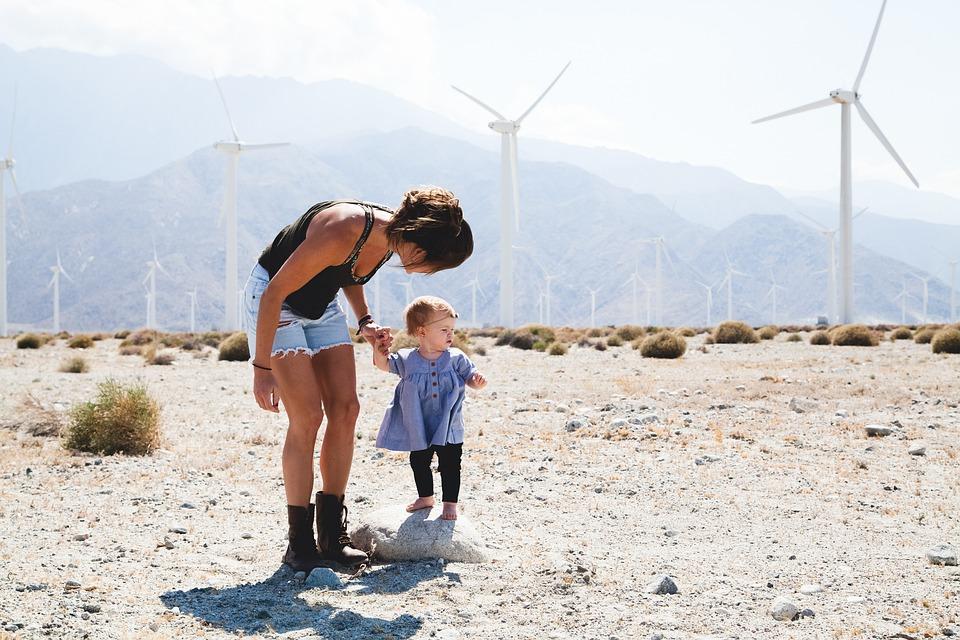
33
6.2. Ask questions to your children
During a chat and walk in May 2022 at Richterswil just outside Zürich in Switzerland, Katja Rieger explained that she wants to move from telling her son things to being curious about what he thinks and feels.
At location 3150 of the book “Emotional Agility”, Susan David explained that if a child has difficulty making friends, you can ask,"Where are good places to start connecting with people?"20
6.3. Listen to your children
On page 213 of the book “Raising competent children” Jesper Juul explained that to be as valuable to children as parents want to be, parents need to listen to their children, recognize them as competent and learn from them.21
20 https://www.goodreads.com/review/show/1918959132
21 https://www.goodreads.com/review/show/3745257239
34
6.4. Communicate calmly with your children
On page 193 of the book “Kindern mehr zutrauen”, Michaeleen Doucleff writes that it is unproductive to be angry with your children. Instead, parents need to react with friendliness and calmness towards their child / children.
Why is it really important that parents control their anger and speak calmly when they communicate with their child / children? There are more reasons. Some examples:
1. If a child is often yelled at by his or her parents, the child will - sooner or later - stop listening.
2. Every time a child is yelled at, he or she learns that shouting and anger are helpful tools to solve problems. As a consequence, the child will practice being angry and shouting.
3. When parents react with calmness and friendliness towards their upset child, they give their child the possibility to find this possible reaction in himself or herself. In other words, they give the child the possibility to practice calming down.
35
6.5. Avoid judging your children
In a conversation during a walk and over a cup of tea in May 2022 Esther Lopata explained that both of her parents were very religious. Each night before Esther and her siblings went to sleep, their mother or her father came by to say good night to the five children. During this before sleep conversation, each of the children was asked by their parents to pray to God. Esther explained that she and her siblings would, for example, express thankfulness as well as communicate wishes they had. The children were told by their parents that if they did not pray to God or believe in God, they would end up in hell.
Asking Esther how she felt about his message from both her mother and her father, she said that she developed much fear and suffered a lot from it - as a child and as an adult. Asking Esther in a follow-up question what she did to manage her fear and relieve her suffering, she explained that having conversations with good friends and her mother’s father as well as reading books helped her to feel more safe and free.
Talking about what helped her in conversations with her grandfather, Esther explained that her grandfather, who worked as president of the municipality, where he lived, accepted Esther as the human being she way. Following up on this, Esther mentioned that her grandfather was, like Ester’s parents, quite religious. However, he did not in any way try to persuade her to pray to God or believe in God.
36
During the conversation Esther also explained that it is of strong importance that parents do not expect their children to do certain things for their parents, when parents get old. Elaborating on this, Esther explained that she hopes that her children will think positively about their childhood and upbringing. However, she doesn't want her children to think that they must give back something to her and her husband.
At location 3000 of the book Emotional Agility, a book written by Susan David, I read that when parents let their children know that they do not judge them, they signal that they accept their emotions. Thereby, parents also help children to calm down and feel neither fear, shame or guilt.
Instead of trying to fix things quickly, parents are better off simply pausing and listening. When a child feels fully seen and acknowledged by those around him, he / she will feel loved and secure.
When a child feels loved and secure - and not rejected, punished or shamed for feeling what he / she feels - he / she will feel free to live with any emotions. For example, when a child feels shame, he / she will feel free to live with that emotion, understand where it comes from and why it is there.22
22 https://www.goodreads.com/review/show/1918959132
37
6.6. Use digital technology to communicate with your children
In a conversation during a walk and over a cup of tea in May 2022 Esther Lopata explained that communicating with children via digital technology can have a positive impact. We talked, for example, about the use of WhatsApp and Skype. In this regard, we discussed the positive effects it can have when there is a screen between two persons - including the effect that emotion can have less influence on conversations over Skype compared with a face-to-face conversation when people are in the same physical room.
6.7. Use music to communicate with your children
On pages 259-260 of the book “Kinderjahre”, Remo Largo explains that children love music. By the age of 2 months, the infant can recognize the way the mother sings by the pitch, volume and melody. Once children can stand and walk, they dance when they hear music. They rock their bodies back and forth and do simple sequences of steps. They show a fine sense of rhythm and an often amazing ability to express themselves.
38
Source: https://pixabay.com/illustrations/to-dance-children-s-drawings-ballet-83478/
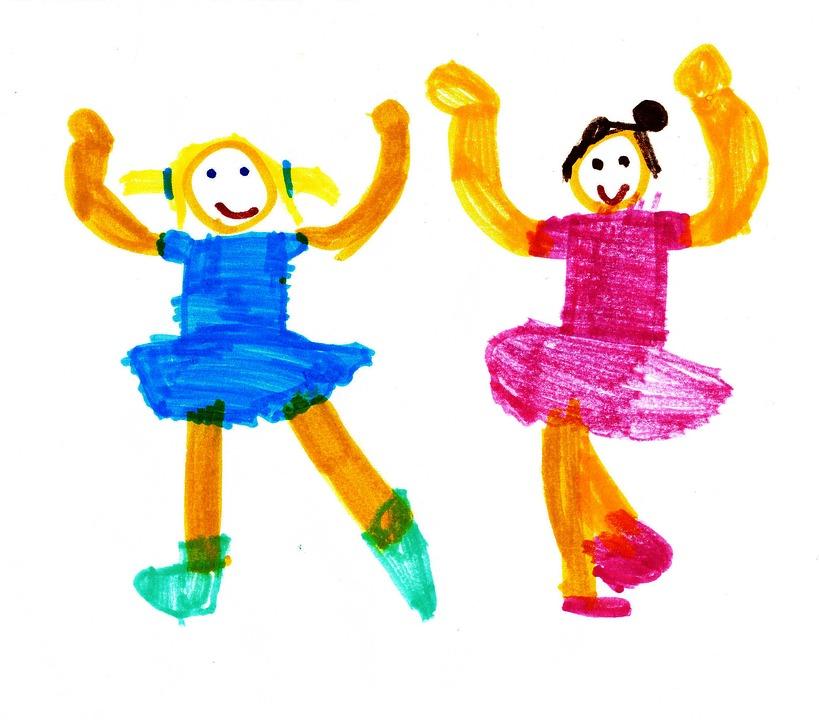
39
Before the start of a classic music concert in the church of Ligerz in Switzerland, Mark Adams, who is the father of 4 children and lives with his wife Maja in the Southern part of New Zealand, explained that he changed the way he parents a few times.
Mark explained that when his children were small he used the word “parenting” in his mind to describe what he was doing. As his children got older, he transformed the way he parented into a more coaching related style. Later, as his children got independent and moved out of the family, Mark experienced that he, using his words, “got sacked” by his children. And now, that his children are in their 20s, his parenting role has changed into being a friend of his children.
40
7. What are ways that parents can sustainably develop relationships with their children?
7.1. Adapt the way you parent to needs of your children
7.2. Learn about the personality of your child
During a chat over a sandwich Mark Adams explained that learning about the personality of his son helped him parent better. For example, Mark mentioned that his son Joel scores relatives high on the personality dimension conscientiousness23 and has a strong need to prepare and organize before doing something. Mark also explained that he himself scores relatively low on this personality trait and is naturally spontaneous.
7.3. Support children in pursuing their goals
Adam Grant explained that children’s achievements are not status symbols for parents. As a parent, your job is to support kids in pursuing their goals - not push them towards yours, he added. The key question is not what accomplishment will reflect best on you - it’s what activity will best build their character.24
23 https://issuu.com/frankcalberg/docs/conscientiousness
24 https://www.instagram.com/p/Cach8cuLMei/
41
Source: https://pixabay.com/photos/child-kid-play-study-color-learn-865116/

42
7.4. Praise values of your children
During a Thinkers50 LinkedIn live session25 , Julie Carrier provided this answer to the question “What can parents do to help their child / children develop self confidence? What are your experiences?”: “Give more praise based on character and less praise based on outcome. Example: "Rebecca, I noticed that you stayed after school. I was impressed by your kindness."”
43
25 https://www.linkedin.com/video/event/urn:li:ugcPost:6922483327404777472/
7.5. Share experiences with your children
Following a tutoring session in the family home, 11-year-old Thurga, whose parents come from Sri Lanka, explained that she, her brother and their parents eat dinner together and share with each other what they experienced during the day.
Dominique, who preferred to use a different name than her real name, explained during a walk and talk in a park that she, her husband and their 3 children eat dinner together every day. They find it important to talk with each other about what each of them experienced during the day.
44

45 Source: https://pixabay.com/photos/family love outdoors care together 6748952/
Source: https://pixabay.com/photos/mother-daughter-laughing-family-937038/

46
7.6. Express gratitude towards your children
About 40 minutes into a fireside chat26 hosted by Rita McGrath, Whitney Johnson explained this:
“When I think that growth is our default setting, I will often say to my children: I am so grateful that I now get to figure out how to parent you as an adult. Just because you are 21 and 25 does not mean we are finished.”
https://youtu.be/bato5m6uvZU
47
26
7.7. Talk with your child about who mother and father are
During a chat and walk in May 2022 at Richterswil just outside Zürich in Switzerland, Katja Rieger explained that now and then, when her son wants to know more about his father, she speaks with her son about what she knows about her son’s father. Katja, who gave birth to her son after being artificially inseminated, explained that she acquired much information about the father of her sonincluding the eye color, height and profession of her son’s father.
7.8. Play music for and with your child / children
In a conversation during a walk and over a cup of tea in May 2022, Esther Lopata explained that her father was a musician. He played the piano for people, she said. During the conversation Esther recalled that when her father played the piano, it helped strengthen the relationship between Esther and her father.
48
Source: https://pixabay.com/photos/piano

49
music instrument musician 3831642/
7.9. Take a trip with your children or grandchildren
During a conversation in a supermarket in May 2022, Esther, who worked in sales during a large part of her life - driving from customer to customer in Switzerland, explained that she recalls that her grandfather sometimes went to Italy over the Summer to buy. There was so much joy during this shoe buying experience, Esther explained.
About 40 minutes into a fireside chat27 hosted by Rita McGrath, Whitney Johnson asked this question to herself:
27 https://youtu.be/bato5m6uvZU
50
7.10. Try out new ways of connecting with your children
“How do I have enough newness in how we connect to each other?”
7.11. Spend time with your children
On page 176 of the book “Kinderjahre”, Remo Largo writes:
“The lasting bond between mother and father and their child develops from countless small and large experiences that they have together over months and years. Time together is one of the most precious things a parent can give their child.”
51
8.1. Breastfeed your children
Sharon Bättig-Diaz, who was born and who grew up on a plantation in Sri Lanka, is a mother of 3 children and a grandmother of 2 children, mentioned that in her view breastfeeding is natural.
8.2. Touch your children
Touching your child / children has numerous benefits such as helping her or him feel calm / less anxious / relaxed.28
28 https://www.linkedin.com/posts/kim
6131131b3
touch parent ugcPost 6968863197848092673 rZOT
52
8. What are ways that parents can help their children develop awareness of the human body?
mcneilly %F0%9F%8C%B7
human
Source: https://pixabay.com/photos/baby-hands-fingers-infant-child-2416718/
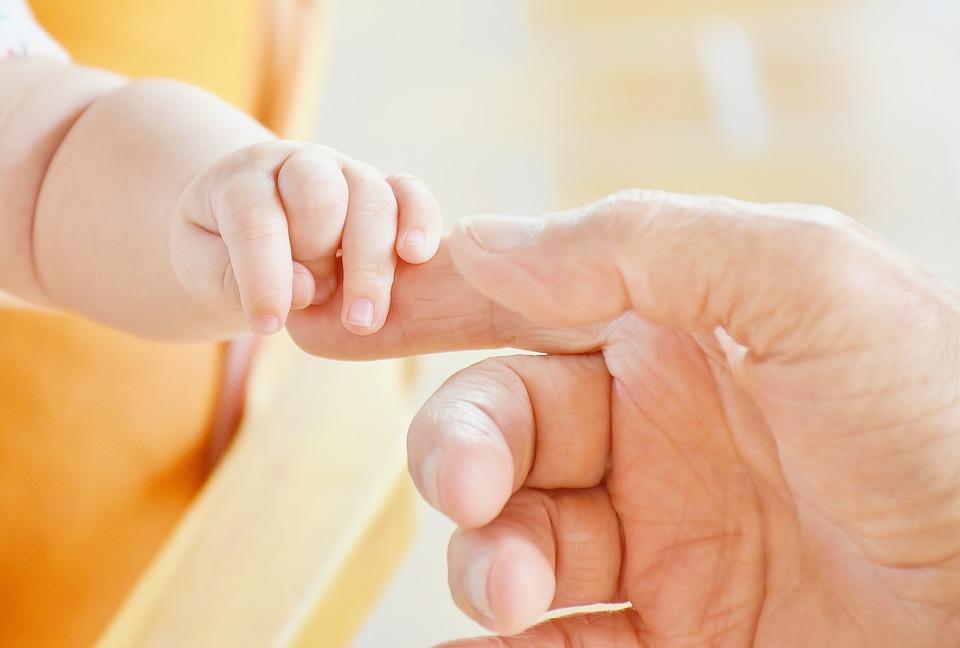
53
During a conversation in a supermarket in May 2022, Esther, a Swiss woman who worked for a large part of her life in sales driving from customer to customer in Switzerland, explained that her parents rarely hugged her. “It was very strange”, she said.
During a conversation over a cup of coffee in 2021, Christian P. Casparis, a Swiss man, explained that his parents did not hug him or his siblings. Skin was there to be scrubbed when taking a bath once a week, Christian wrote in his biography. Elaborating on this, Christian P. Casparis mentioned, I recall, that he had suffered quite a lot from the relatively strict way that his parents - in particular his mother - had brought him up. For example, tears would call for a “don’t be a crybaby!”, Christian wrote in his biography. And his mother would often, he wrote in his biography and explained in the follow-up conversation, demonstrate a “stiff upper lip” - not expressing emotions she felt.
From the conversation with Christian, I also recall that it was from his Italian wife that he learned what was missing in his heart about expressing emotions he felt. For example, I remember Christian telling me that it was from his wife that he learned to cry and wear more colorful clothes. Listening to Christian P. Casparis talk about his life it became clear that expressing both sadness and joy through tears was an important learning experience for Christian. During the conversation with him, I noticed that tears were rolling down his face on more occasions - as he shared experiences that triggered positive as well as negative emotions.
54
8.3. Do parent-child gymnastics with your children
During a freethinkers event via zoom on September 16th, 2022, Remo Rusca explained, as he introduced himself, that he worked with generals in the Swiss army. In the live chat of the event, Remo als mentioned that parenting helped develop him. It began, he explained, by being the first father in a child-mother gym session and ended with a process of growing in responsibility.
8.4. Hold your children in your arms
During a walk and talk in September 2022 Esther Lopata explained that she often held in her arms small children she worked with. She experienced that it often had the effect that the children felt calm.
55
Source: https://pixabay.com/photos/father-daughter-family-child-baby-5093047/
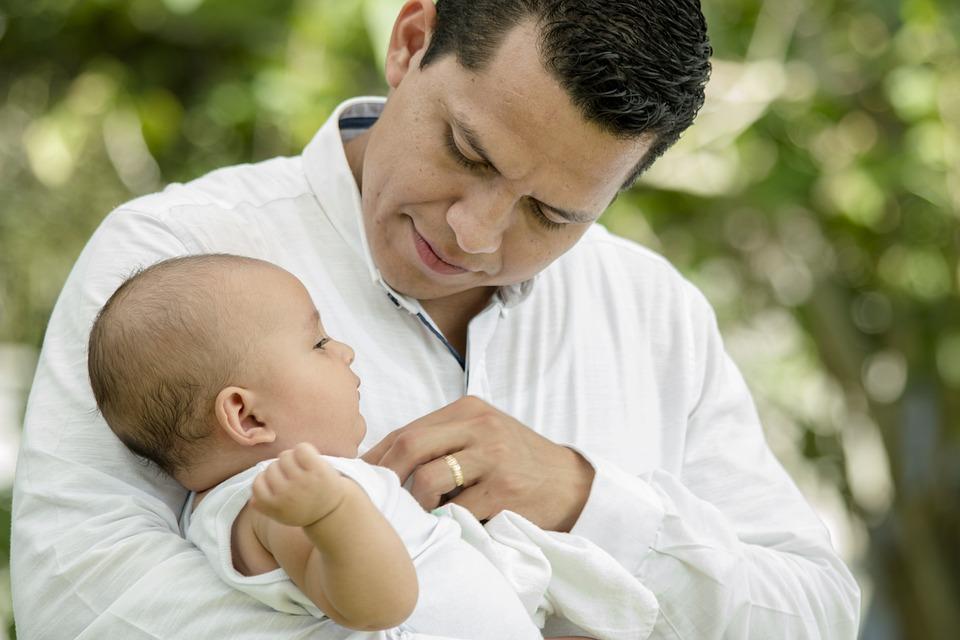
56
9.1. Ask children for help to buy groceries
On page 61 of the book “Montessori for parents”, Simone Davies mentions asking children for help to buy groceries. Examples of activities:
● Make a list of things to buy by drawing them.
● Help out in the supermarket by putting things in the shopping cart.
9.2. Ask children for help to prepare food
On page 61 of the book “Montessori for parents”, Simone Davies mentions asking children for help to prepare dinner. Examples of activities:
● Wash vegetables.
● Weigh ingredients using a scale.
● Set the table.
57
9. What are ways that parents can help their children develop motor skills in sustainable ways

58
Source: https://pixabaycom/photos/cook
chefs apprentice trainee 7363857/
9.3. Ask children for help to wash clothes
On page 61 of the book “Montessori for parents”, Simone Davies mentions asking children for help to wash clothes. Examples of activities:
● Put clothes in the washing machine.
● Put soap in the washing machine.
● Take clothes out of the washing machine.
9.4. Let children create their own playgrounds
On page 202 of the book “Lasst die Kinder los: Warum entspannte Erziehung lebenstüchtig macht”, Margrit Stamm wrote that many playgrounds are used little. Children prefer playing in places that adults do not even consider playgrounds, for example forested areas with caves.29
29 https://www.goodreads.com/review/show/2512751574
59
Source: https://pixabay.com/photos/child-puddle-water-play-fun-rain-5582986/
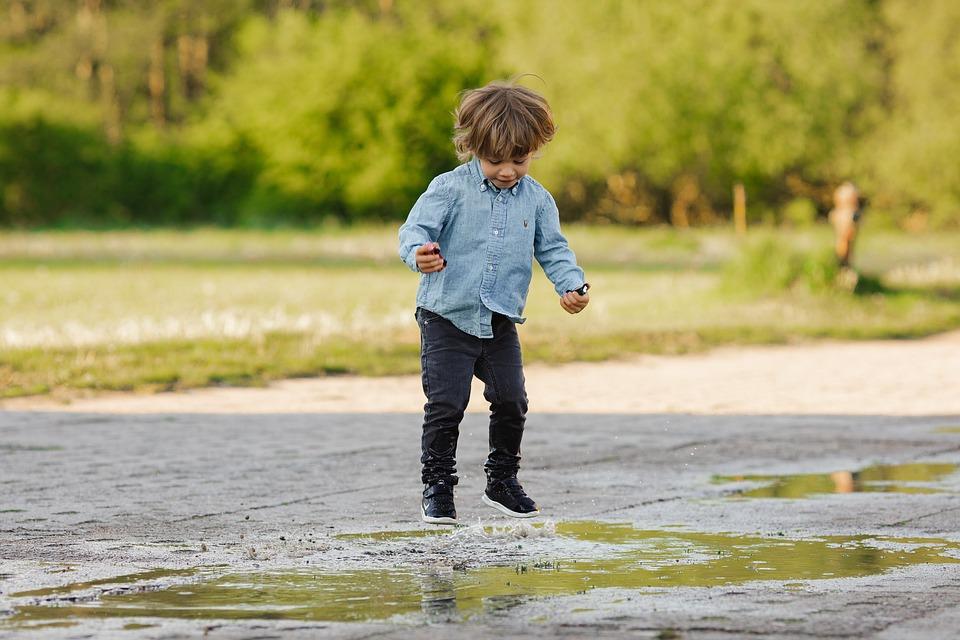
60
On page 191 of the book “Kinderjahre”, Remo Largo writes:
“Children want to grow up with other children. They demand social acceptance early on and want to take up a position in the group that suits them. Shared experiences make a decisive contribution to the development of social skills.”
61
10. What are ways that parents can help their child develop social competencies?
10.1. Enable your child to play with other children
Source: https://pixabaycom/photos/children sandbox boy girl son 1730248/
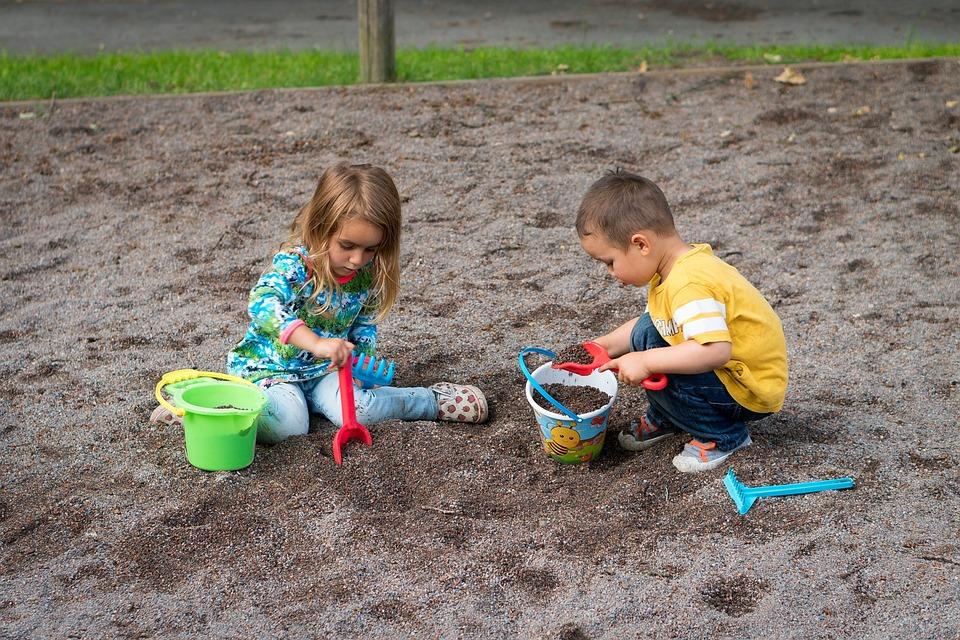
62
A review of 83 articles suggests that engaging with nature improves physical, emotional, and social development in 3- to 18-year-olds, as well as perceptions of nature and environmental attitudes.30 Dominique, who preferred to use a different name than her real name, mentioned during a walk and talk in a park in Zürich that forest play groups in Switzerland, named “Waldspielgruppe”, are among the best initiatives for children that she knows about. The mother of 3 mentioned that all of her children learned a lot from participating. Dominique explained that the immune system of her children improved as a direct result of her children playing in the forest. Also, she observed that in the forest, her children play with other children than her children play with inside a building.
10.2. Help your child to learn to help others
On page 97 of the book “Kindern mehr zutrauen”, Michaeleen Doucleff writes that children are born with the wish to help their parents. However, children often do not know how they can be helpful. The job of parents is to help their children learn what they can do to become helpful, for example by showing their children what to do, making tasks easy to do for children and asking children for help to solve tasks.
30 https://www.tandfonline.com/doi/abs/10.1080/00958964.2017.1366160
63
On page 78 of the book “The social instinct: How cooperation shaped the world,” Nichola Raihani writes that for most of our time on earth, children have been raised by multiple caregiversincluding parents, brothers and sisters, grandparents as well as aunts and uncles. Increasingly, external caregivers / educators provide services for children / families.31
On page 183 of the book “Kinderjahre”, Remo Largo writes:
https://www.goodreads.com/review/show/4826705286
64
10.3. Help your child be cared for by several caregivers
“It is good for a child's development if he or she is cared for by several caregivers. The child can develop his or her social skills better, learns from different role models and has more opportunities for making experiences.”
31
65
11.
What
are ways that
parents
can help
their children
develop responsibility?
11.1. Ask questions to your children when they misbehave Leon Khaimovich shared 7 questions32 to ask children to answer after they misbehaved. He explained he started using the questions when his children were about 6 years old: 1. What did you do? 2. Why did you do that? 3. What did you want to accomplish? 4. What actually happened? 5. Why was it wrong? 6. What will you do to fix it? 7. What will you do to prevent it from happening again? 32 https://www.linkedin.com/feed/update/urn:li:activity:6929003767774236672?commentUrn=urn%3Ali%3Acomment%3A%28activity%3A692900376777423667 2%2C6929319902159777792%29&replyUrn=urn%3Ali%3Acomment%3A%28activity%3A6929003767774236672%2C6930268537903026176%29
On page 180 of the book “Raising
which
40 minutes into a fireside chat
children” Jesper Juul explained that to create a
develop
healthy ways, focus on dialogue - not on getting
with Rita McGrath, Whitney Johnson mentioned this:
66
11.2. Focus on dialogue - not on getting and giving permission
competent
family, in
all members thrive and
in
and giving permission.33 About
34
“How do I make sure that no matter what, I maintain my relationship with my children? What do I need to do to do that? I need to have boundaries. I need to not be permissive. I need to focus on the relationship, because that is the most important thing.” 34 https://youtu.be/bato5m6uvZU 33 https://www.goodreads.com/review/show/3745257239
11.3. Gradually give your children freedom to do things
Dominique, who preferred to use a different name than her real name, explained during a walk and talk in a park that as her husband works between 60 and 70 hours a week, she does much work in the household. She explained that when school, clubs, library and other services, which her children use, are located relatively close to each other, she feels safe to give children freedom to get to where they need to go by themselves.
Dominique also explained that her children can choose to do their homework whenever they want to. Dominique and her husband only have one rule that their children must obey: The children must do their homework every day.
Teachers, who work for the nursery Kinderkrippe Tierlihof, explained that children help out, for example feeding animals and collecting eggs from chickens. Caring for a living being makes a child feel that she or he is needed. As the child grows older, it also increasingly learns to take responsibility for individual tasks. It is encouraged in its independence. The child develops more and more empathy, sensitivity and respect for others.35
https://www.stadt-zuerich.ch/sd/de/index/familien kinder jugendliche/beratung/Muetter und Vaeterberatung/ihre haeufigsten fragen/kleinkinder-tiere/kita-tie re.html
67
35
11.4. Talk with your child about consequences of their decisions
During a conversation in August 2022 via Google Meet, Sophie Rudolph described her parenting as freestyle involving no or few rules. Instead of creating rules, Sophie explained that she communicates with her son about consequences of his decisions. For example, if her son does not sleep enough, they talk about experiences he had being tired the next day.
68
11.5. Trust your children
During a freethinkers event on September 15th 2022 focusing on the question “How do we radically innovate our workplace and elevate humans and business?”
36 Alessandra Di Leo wrote this in the live chat:
“Everything became so much easier and beautiful when I started trusting my daughter and being in awe with her evolution and growth - rather than trying to control it."
36
69
https://www.linkedin.com/events/freethinkerscornergloballaunchc6971232306392932353/comments/
To the question “What happened that helped you move from control to trust?” Alessandra Di Leo responded:
“I think it was 2-fold:
1.External: Coming from experience, seeing my daughter, everyday, being able to do things on her own time. This requires presence and the will to look at her.
2.Internal: I had to do a lot of personal development to learn to be with uncertainty and anxiety, breathe and be ok with it.”
70
12.1 Talk about differences between spending, investing and donating Dominique, who preferred to use a different name than her real name, explained that she and her husband, who works in investment banking, talk to their children about the expressions spending, investing and donating. She added that for her children it is easier to understand spending and investing than to understand donating.
During a pitch session in June 2022 hosted by uplink and focusing on circular economy innovations, the moderator asked one of the judges, Nico Rosberg, a former Formula 1 world champion and greentech entrepreneur, why he chose to become a greentech entrepreneur. Nico Rosberg mentioned that one of his goals is to inspire his daughters aged 4 and 6.
71
12. How can parents help their children understand sustainable finance?
12.2. Help develop greentech initiatives and talk to your children about it
During a drive - walk - talk in June 2022 with artists Gerda Geuggis and Gottlieb Huber, Gerda mentioned that she asked her grandchild to what extent it is boring for her to drive by car with her parents to Leukerbad in Switzerland. Gerda’s grandchild responded that when she drives in a car with her parents there are no restrictions as to how much she can use her tablet - leading to the effect that she does not get bored.
Dominique, who preferred to use a different name than her real name, explained that she is worried that her children use electronic devices and the Internet too much. Asking her why she is worried about that, she explained that she finds face-to-face conversations as well as moving our bodies important.
During an interview at the World Economic Forum in May 2022, Susan Wojcicki, mother of five children and CEO of YouTube, explained that she limits screen time for her younger children.
72
13. How can parents and children use technology in sustainable ways?
13.1. Talk to children about when they use and do not use electronic devices
Elaborating on this, Ms.Wojcicki, who has worked for Google since the company was founded, explained she finds balance important.Too much of anything is not a good thing, she said.37
Source: https://pixabay.com/photos/child student video conference 5976952/ 37 https://youtu.be/Pi72kfigcL8 from minute 21.
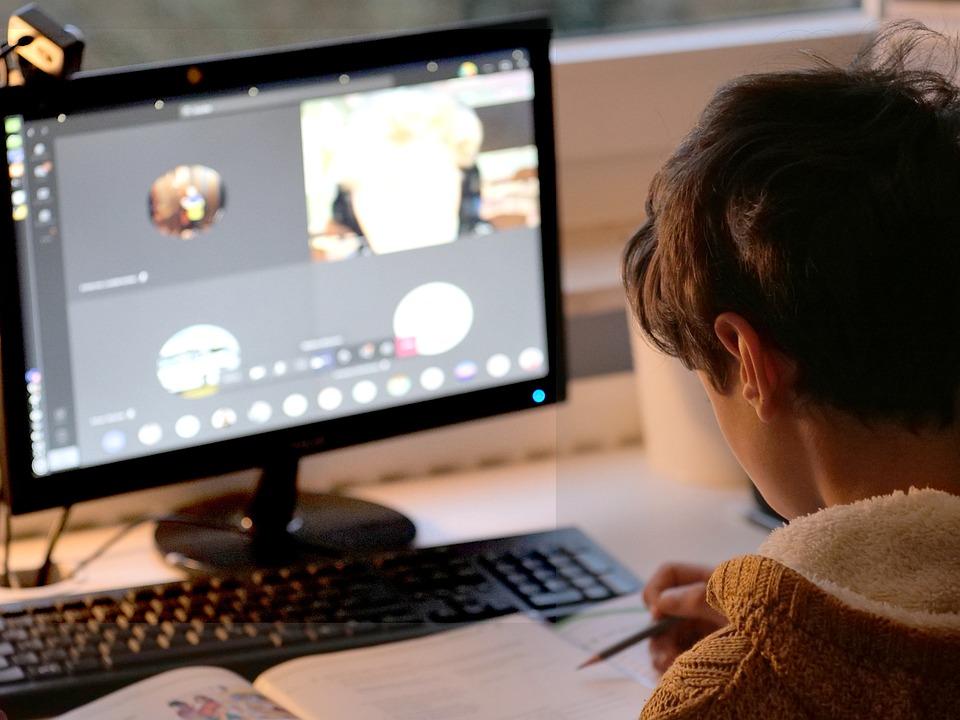
73
13.2. Use technology for coaching
Keller explained that when she and her partner meet a coach to communicate and learn about the development of their children, technologies such as zoom are increasingly used. This increases flexibility and makes it easier for everyone to participate in dialogues about child development, parent development and teacher development.38 Following up with the question “What do the teachers, who learn best
adapt to this New Work World, do really well? What are the top experiences you have had?” Melanie Keller responded39:
74
Monika
and
39 https://www.linkedin.com/feed/update/urn:li:activity:6948509406451924994?commentUrn=urn%3Ali%3Acomment%3A%28activity%3A694850940645192499 4%2C6948515559743356928%29&replyUrn=urn%3Ali%3Acomment%3A%28activity%3A6948509406451924994%2C6948544893136875520%29 38 https://www.linkedin.com/feed/update/urn:li:activity:6948509406451924994?commentUrn=urn%3Ali%3Acomment%3A%28activity%3A6948509 406451924994%2C6948515559743356928%29&replyUrn=urn%3Ali%3Acomment%3A%28activity%3A6948509406451924994%2C69485357 53039601665%29
“They are empathetic and able to put themselves in the other person's perspective. They realize that nowadays both parents often work and are not always available. They ask when / how it fits best and go along with it when it comes to it or are willing to compromise when it comes to finding creative win-win solutions for everyone.”
75
During a conversation with Daniela and Jochen Sorg, Daniela explained that her mother was a very curious woman. When she came across a word she did not know well, she looked it up in the dictionary and read about the word to better understand its meaning. Daniela explained that this curious behavior of her mother helped Daniela to also stay curious.
14.2. Read aloud for your children
On page 79 of the book “Kinderjahre”, Remo Largo writes that when parents read aloud for children, children will acquire interest in books.
76
14. What can parents do to stimulate interest children have in learning?
14.1. Look up words you do not understand
14.3. Read yourself
Adam Grant mentioned that children learn more by watching what their parents do than by being told what to do.40 In other words, to help children read, read yourself.
14.4. Give your children freedom
During a conversation in August 2022 via Google Meet, Sophie Rudolph explained that she gives her 8 year-old son much freedom. She experiences that her son is naturally curious and proactive in the way he learns. During the conversation Sophie also mentioned that as her son started to get grades for work he did at school, he started putting himself under more pressure.
Sophie Rudolph explained that in first grade, students are given homework once per week and in second grade twice a week. If homework is not done 3 times, an extra homework task is given by the teacher. Sophie explained that this type of punishment put her son under even more pressure..
40 https://twittercom/AdamMGrant/status/1561371232506978304
77
14.5. Let children play a lot
Learning at forest school is play-focused. And perhaps children have more choice and control in forest school than in the typical classroom, which is more structured. In forest school, children are able to follow what interests them, which may be more conducive to learning.
41 https://bold.expert/do children benefit from forest school/
41
78
Source: https://pixabay.com/photos/girl-playing-soccer-ball-happy-1004432/
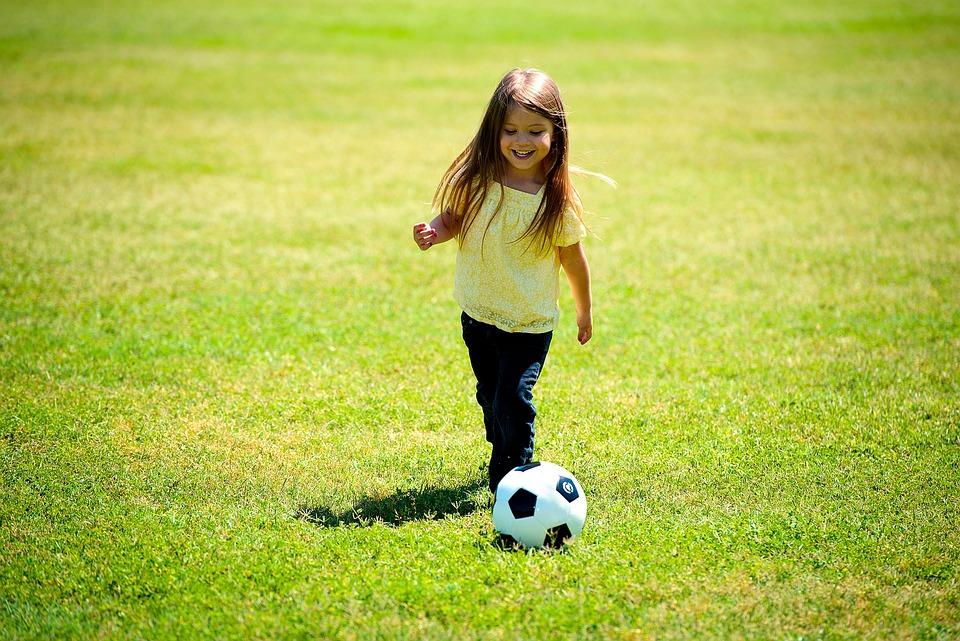
79
14.6. Help children experience well-being
On page 89 of the book “Kinderjahre”, Remo Largo writes that children, who feel physical and mental wellbeing will unfold their development potential.
14.7. Praise your children for their competencies
On page 295 of the book “Kinderjahre”, Remo Largo explained that children are happy when they receive social recognition for their skills and abilities. Elaborating on this, Remo Largo explained on page 201 of the book that children's strengths should be encouraged instead of working on their weaknesses.
80
15.1. Listen to needs your partner has Sharon Bättig-Diaz explained during a phone call in June 2022 that when she got cancer and lost her hair, she felt she had the energy only to look out for herself. During this process she wanted to do everything by herself. As a consequence she distanced herself from her husband and from other people. It was important, Sharon mentioned, that people around her understood that she had the need for doing things on her own.
During a conversation on a street in Zürich, Heinz explained that humor is very important to make the relationship between his wife and him work. He mentioned that he has been married to his wife for 48 years, and that they have 3 children together. From what Heinz explained, I understood that it has been particularly important for their relationship that he smiles and laughs at his own behavior. Heinz built on this by saying that in his experience the strong focus on ego in societies today is making it difficult for relationships to work. Everyone is working on her or his own, personal needs. Earlier, people focused more on the needs of the other person, Heinz explained.
81
15. What can parents do to make their relationship work?
15.2. Split up tasks
In a conversation during a walk and over a cup of tea in May 2022 Esther Lopata explained that she does not know any parents, who did not feel stressed when their child or children were small. She mentioned that she and her husband Avi split up tasks in the following way: Avi worked outside the home, and Esther solved tasks in the home - including preparing food and washing clothes. Splitting up tasks and having clear responsibilities about who takes care of which tasks helped reduce stress.
Flavio Nef explained that he and his partner share the responsibility of putting Emilio, the child, to bed and taking responsibility for the following night. Flavio also explained that he and his partner divided up big household chores such as washing clothes and vacuuming.42
https://www.stadt-zuerich.ch/sd/de/index/familien kinder jugendliche/beratung/Muetter und Vaeterberatung/ihre haeufigsten fragen/vaeter-emotional-ment al load/testimonial mental emotional load.html
82
42
15.3. Help each other
During a citizen science chat in May 2022 via the platform Wonder, Sophia, a mother of 2 children aged 3 to 5, explained that her children often wake up in the middle of the night - resulting in little sleep for everyone in the family. As I understood, the family is searching for solutions to find out how to solve this challenge.
Tailor and dressmaker Ms. Tairi explained during a chat in her shop that her daughter, who has two small children, needs to stay home when her children are sick and not allowed to be in the kindergarten. The situation can be challenging for more people, and they are searching for solutions to find out how to solve this challenge.
15.4. Communicate well with each other
During a conversation on the stairs of a house in Zürich with artists Gerda Geuggis and Gottlieb Huber, Gottlieb explained that his parents had many arguments with each, other and that he often found himself in the middle of those discussions. He added that he often had strong difficulty finding out whether he should - during these difficult conversations between his mother and his father - take the side of his mother or the side of his father. Gottlieb Huber explained that he
83
suffered quite a lot - when he was a child as well as later in life - from the difficult conversations his parents often had with each other.
Gerda Geuggis, who has 3 children and 3 grandchildren, explained that in her view, it is better that parents, who do not get along with each other and regularly communicate with each other in unsustainable ways, live in different houses or apartments. She added that these houses or apartments must be relatively close to each other, so the children can easily be with both their mother and their father.
In a follow-up conversation in 2021 with Christian P. Casparis about his biography, I recall Christian elaborating on the communication of his parents. They did not discuss disagreements or misunderstandings in front of their children, he explained. Their ups and downs never showed. Whenever a subject came up that they found was out of bounds, they would switch from English to French and use the expression “pas devant les enfants” meaning “not in front of the children.” In his biography Christian wrote that this chronic harmony between his parents had, in his view, a lot to do with what he described as his mother’s “incredible resilience.”
84
15.5. Talk about gender roles
Following a tutoring session, 15-year-old Raiyan, whose parents come from Bangladesh, explained that his mother, who is separated from Raiyan’s father, prefers to do everything in the household on her own. Raiyan’s mother does not wish to get help from Raiyan, Raiyan explained. 11 year-old Thurga, whose parents come from Sri Lanka, explained that her mother does everything in the household on her own. Thurga added that during holidays, she and her older brother can participate in suggesting what they eat and in making dinner.
During a chat over LinkedIn, Dániel Solymosi mentioned this in relation to questions that came up about the topic of dinner:
85
“It sheds light on the gender roles between the parents. The classical "breadwinner" father, caretaker mother etc. This may be an unconscious model for the kids and may as well influence their relationship to food based on their gender.”
Sharon Bättig-Diaz explained during a phone call in June 2022 that you need to water your relationship to make it bloom. When she had children she and her family went away now and then to nurse their relationship.
86
15.6. Take time together away from the home once in a while
Source: https://pixabay.com/photos/couple-alley-park-leaves-autumn-2878848/

87
16.1. Accept everything
During a conversation in August 2022 via Google Meet, Sophie Rudolph explained that in her experience it is important to accept everything. This was difficult for her because she felt hurt, Sophie explained.
16.2. Respect the other parent
During a conversation in August 2022 via Google Meet, Sophie Rudolph explained that respect between her and her husband was the most important thing during their divorce. She also mentioned that it is important to understand that not only the other person has made mistakes.
88
16. What can parents do to make a break-up between them work?
Source:

89
https://pixabay.com/photos/handshake shaking hands respect awe 442908/
On page 100 of the book “The truth about children and divorce” Robert E. Emery writes, “Being open with your children about problems you have will help the children learn that a relationship between two people is far from perfect, and that one of the most important things about a good relationship is acknowledging difficulties and finding a way to resolve them as well as you can.”
https://www.goodreads.com/review/show/4011705285
90
16.3. Be open with your children about problems you have in your relationship
43 43
16.4. Tell your children exactly what will happen
On page 100 of the book “The truth about children and divorce” Robert E. Emery writes, “All that children under the age of 3 can absorb is a simple explanation such as "Mom and Dad are going to live in different houses." Even simple explanations like this need to be repeated frequently to very young children.44
In the book Robert E. Emery also suggests telling children of divorced parents exactly where their mother and father will live, when they will be with whom:
● Page 116: Tell your children which of the parents is going to move out of the house and when. Example: “Your father is going to move out of this house in x weeks. In a few days he will show you where he will live. Your mother will keep living here - at least until the end of this school year. She will look for a new place to live.”
● Page 116: Tell your children that both their mother and father will find places to live that makes it possible for the children to go to the same school as now and see their friends.
● Pages 106 and 116: Tell your children when they will be with each of you - including what days the children will sleep where.
● Page 113: Tell your children how they will get from Mom's place to Dad's place and from Dad's place to Mom's place.
44 https://www.goodreads.com/review/show/4011705285
91
16.5. Find parenting solutions that work for everyone
During a conversation in August 2022 over Google Meet, Sophie Rudolph explained that she and her former husband developed a shared parenting solution, when they stopped living in the same household. She elaborated on this by saying that a consultant helped them to find a solution where the welfare of their son would be prioritized.
More concretely, Sophie and her former husband and father of their child developed a solution through which their son would live 50% of the time with his mother and 50% of the time with his father. Currently, what works for them is that their son lives with his father Monday and Tuesday every week as well as every 2nd weekend. At the time where Sophie and her husband divorced, this was a pioneering parenting solution.
Sophie Rudolph added that the father of her child now lives with a woman, who has a child from an earlier relationship. Sophie also explained that the father of her child and his partner now have a child together.
92
On page 114 of the book “Thinking in Systems”45 , Donella H. Meadows and Diana Wright wrote: During the 1930s, the birth rate in Sweden dropped. There was a basis of agreement in the Swedish government to focus not on the goal “size of a family” but on the goal "quality of child care". Every child should be wanted and nurtured. No child should be in material need. Every child should have access to excellent education and health care.
The resulting policy included free contraceptives and abortion. The policy also included widespread sex education, easier divorce laws, support for families in need and greatly increased investment in education and healthcare. Since then, the Swedish birth rate has gone up and down several times without causing panic in either direction, because the nation is focused on a far more important goal than the number of Swedes.
45 https://www.goodreads.com/review/show/4811638848 page 114.
93
17. What can governments do to strengthen sustainable parenting?
Sources
18.1. Books
Author Book
Brown, Brenée: Rising strong.
David, Susan: Emotional agility.
Davies, Simone: Montessori for parents.
Doucleff, Michaeleen: Kindern mehr zutrauen.
Emery, Robert E.: The truth about children and divorce.
Juul, Jesper: Raising competent children.
Largo, Remo: Kinderjahre.
Meadows, Donella H. and Wrigh, Diana: Thinking in systems.
Raihani, Nichola: The social instinct: How cooperation shaped the world.
Stamm, Margrit: Lasst die Kinder los: Warum entspannte Erziehung lebenstüchtig macht.
94 18.
18.2. People I learned from
Person Profile link
Mark Adams
https://www.linkedin.com/in/mark-adams-98a4b876/
Kurt Bättig https://www.linkedin.com/in/kurt-b%C3%A4ttig-29227b1a/
Sharon Bättig-Diaz
Whitney Johnson https://www.linkedin.com/in/whitneyjohnson/
Monika Keller https://www.linkedin.com/in/pmpmkeller/
Alessandra Di Leo
Esther Lopata
Nora Maria Raschle
Natalia Rezinkova
https://www.linkedin.com/in/alessandra-di-leo/
https://www.linkedin.com/in/nora-maria-raschle-16a36045/
Sophie Rudolph https://www.linkedin.com/in/rudolph-sophie/
Katja Rieger
https://www.linkedin.com/in/katjarieger/
Remo Rusca https://www.linkedin.com/in/remorusca/
Dániel Solymosi
https://www.linkedin.com/in/danielsolymosi/
95
font used
96 18.3. Text
Arial.
19. Reflections on the process
Towards the end of the writing process, Eve Simon asked me these 4 questions:
1. How did I come to write this book?
2. Why open source?
3. What is the key insight of the book?
4. How do people use the book?
Reflecting on the questions, these are thoughts that came into my mind:
97
3 experiences come into mind regarding how I came to write this book. All three experiences go back several years:
1. For some years I have been helping children do homework. In this regard, I learned - by communicating with children as well as with their parents - about different aspects of child development and parenting. What I found out is that parenting is a significant leadership challenge. And I was curious to learn more about that.
2. Personally, I experienced that my parents divorced when I was five years old. The divorce brought with it some challenging situations. A motivation to write this book was to better understand what happened in my life, and how my mother and father did parenting.
3. Being naturally curious about various aspects of child development as well as various parts of leadership development was also a driver for me to read about and communicate with parents and researchers about the topic.
98
19.1. How did I come to write this book?
19.2. Why open source?
3 reasons come into mind about reasons for using open source in writing and publishing the book:
Reason for open source Explanation
Technology
Several useful self publishing open source platforms are available for people to publish their work. These self publishing platforms offer users possibilities to start small and try things out.
Increase learning I experience that open source helps strengthen learning. How? Transparency helps people get easy access to information. Also, openness lowers barriers for people to work with and learn from each other.
Strengthen giving Sharing work openly is giving. If you want to give, it is very much appreciated: https://www.paypal.com/paypalme/frankcalberg
99
19.3. What is the key insight of the book?
From what Whitney Johnson explained I understood that she spent many moments feeling incompetent as a parent. And then she realized: “Of course I don’t know what I am doing. I am doing something new. I have never done this before.” So, as I understand it, she realized that she was and still is on a learning journey.
What I learn from this is the importance of
1. Realizing that you are not an expert, that you are not perfect.
2. Admitting and apologizing for mistakes you make along the way on your parenting journey. Having the courage to express vulnerability.
3. being curious who your child is, for example by asking your child questions and listening to your child to find out what she or he needs.
4. being curious about who you, yourself, are, i.e. working on better understanding and developing yourself.
5. Asking for help when you need it, i.e. reaching out to others.
100
19.4. How do people use the book?
Two ideas of how to use the book:
1. Use it as inspiration for thinking about how you parent.
2. Use it as inspiration when you have conversations with your child, your partner or other people.
101




















